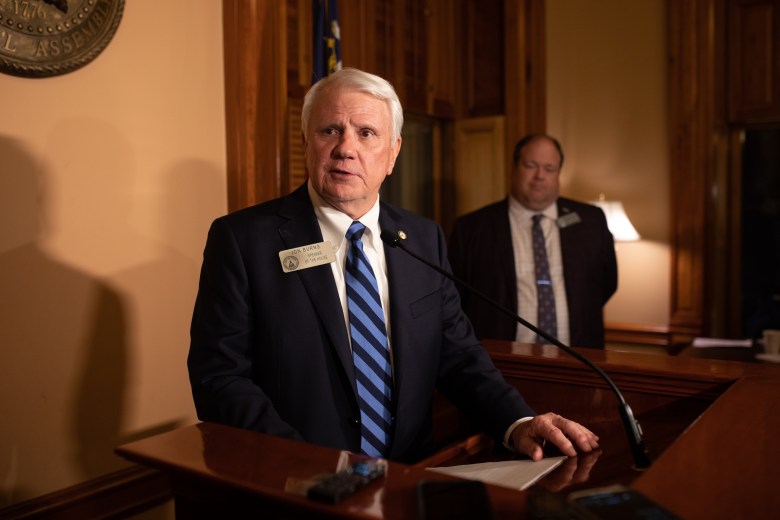Day 40 is the final day that the Georgia General Assembly can meet, it’s referred to as Sine Die (sign-knee-dye), a Latin term meaning ‘indefinitely’. It’s a day where bills either are passed, they don’t receive the majority needed for passage, or simply don’t get considered for debate. Bills that don’t pass or don’t get considered for debate get moved to the next year’s legislative calendar. On this day, the Democrats scored a rare victory as they held the line and prevented the Republican majority from passing a bill that would create a $6,500 private school voucher program directed at students attending low-performing public schools in Georgia.
85 members of the House voted for the measure while 89 members voted against it.
Even though the debate culminated at 8:45PM, nearly seven hours earlier, Minority Leader, Dr. James Beverly, a Democrat from Macon, told a small gaggle of reporters that he believed he had the votes to beat back the measure.
“And when you start to see Republicans voting with us, and these are not mainstream Republicans, folk who are [on the] peripheral and they’re coming our way,” said Beverly. “Not our way as Democrats are coming away on principles. And that’s what we’re going to win. We’re going to win this war, and it’s coming, and I can’t wait.”
After the up-or-down vote, the Republicans asked to reconsider the measure. That vote passed along party lines, 98-73. However, as the night wore on, Senate Bill 233 would not leave the table.

This is how the program would have worked: If a parent wants to use the money to pay for part of a private or homeschooled education, the money would be placed into a Promise Scholarship Account. Additionally, if a parent wants to draw down those funds to pay for a particular school, the state must also determine that the school is authorized to participate in the program (provided that the student gains admission to the private school of his/her choice).
Democrats impugned the idea because the funding for the vouchers would come directly from the Georgia State Budget and would fundamentally destroy Georgia’s K-12 public education system. Even though the program would begin in 2025.
Republicans argued that Senate Bill 233 was not a rejection of the traditional public schools. Co-sponsor of the bill, House Pro Tempore Jan Jones, admitted not every child learns the same. But if no one wants options, that’s okay.
“But the one thing I didn’t hear is the only piece of the metric … the only piece of the rubric that matters: the child,” State Rep. Todd Jones said, a Republican from South Forsyth. “Because ultimately, we should put the child at the center of every decision we make. If we do that, then this becomes in my opinion, a vote for yes.”

Speaker of the House, Jon Burns, voiced his disappointment that the bill didn’t pass. During his press conference, the Republican from Newington promised the bill would be debated when the House returns on January 8, 2024.
“And really was very paradoxical to me as a lot of the impact from 233 impacted some areas that folks were logged down on it, they would not vote for it,” Burns said. They were not considered the proponents of the tenements of the bill and the positive parts of it that impacted communities all over this state. We wanted to see where people were. We wanted to give them a chance to express their thoughts.”
One of the examples against the idea was laid out by State Rep. Becky Evans, a Democrat from Atlanta.
“We do not need another choice of private schools and as for cost we don’t have an estimate,” Evans explained. “We know it’s according to what we’re going to provide in the budget. But I’ve heard some of my colleagues talk about ‘oh, I think it’ll only be 500 students.’ And I’m like, ‘I’m having a very hard time believing that because there are 550 eligible schools.’ So 500 students times six up gets to 3,000,250. But we have examples from these other states where they’re spending $200 million, $240 million.”
In the end, the Democrats convinced enough Republicans that this bill would do more harm to students (equally in rural and urban areas) that don’t have the access to these private schools in addition to the depreciated lack of funding for Georgia’s K-12 public education as it is.
“So right now my kids are going to high school and that school gets that $2,897 base QBE funding,” explained State Rep. David Wilkerson, a Democrat from Powder Springs. “If we take that kid out of the high school, I will now get $6,500. The state is paying to fund that same child. Is that education better?
We know the effect on our local communities. And we know the effect, most importantly, on those children that we’re about to make a promise to. The math doesn’t add up.”


